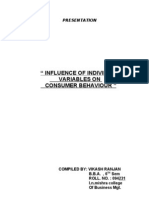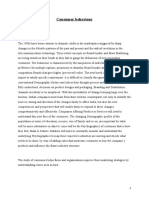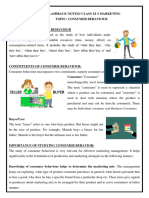Psychology: Since Consumer Behaviour Deals With Emotions, Beliefs and Attitudes
Uploaded by
3795Psychology: Since Consumer Behaviour Deals With Emotions, Beliefs and Attitudes
Uploaded by
3795Consumer behaviour research is the scientific study of the processes
consumers use to select, secure, use and dispose of products and services
that satisfy their needs. Knowledge of consumer behaviour directly affects
marketing strategy. This is because of the marketing concept, i. e., the idea
that firms exist to satisfy customer needs. Firms can satisfy those needs only
to the extent that they understand their customers. For this reason, marketing
strategies must fit in knowledge of consumer behaviour into every side of a
strategic marketing plan. The human behaviour is complex, complete with
controversies and disagreement and there is a common recognition that
consumer behaviour is the key to existing marketing success.
Consumer behaviour has been legitimizing in marketing for it provides the
conceptual framework and strategic thinking for carrying out successful
segmentation of markets.In this way, the field of consumer behavior has
been characterized by variety of viewpoints; as a result, the entire field now
is based on the understanding of consumer behavior appeals to a set of
different areas of knowledge/factors:
• psychological,
• cultural social psychological
• Behavioral
• physio-pyschological
• Genetics anthropology.
Psychology: since consumer behaviour deals with emotions, beliefs and attitudes.
Research on emotions within marketing has evolved three approaches: the categories
approach, the dimensions approach and the cognitive appraisals approach.
What is apparent from the new learning, however, is that we potentially miss those
beliefs and attitudes held at the unconscious or hidden level that can be important to
determining consumer behavior. Also the memory that people hold on their consumer
experiences will drive both aversion and preference towards products. Aversion
behaviour is our avoidance of certain things (brands or marketing offers) made to us
as consumers. The implicit memory registers vast amounts of input from our
surrounding environment as we move through life. Millions of experiences that we
have had throughout our entire lives are stored away in a particular part of our
memory system and can be instantly accessed to help us develop an intuitive 'feeling'
about what we should, or should not do.
Behavior is predominantly determined by intention. Other factors like attitudes,
subjective norms, and perceived behavioural control also are shown to be related to
an appropriate set of salient behavioural, normative, and control beliefs about the
behaviour.. Satisfaction is the central notion of this model, which is formed by the
gap between expectation and perceived performance. If the perceived performance
meets one's expectation, confirmation is formed, and consumers are satisfied and
satisfied users are more likely to continue purchasing the same products.
Culture is the main external factors that shape human behavior. It
represents living style, which came into being after adjustments to the
environment, people, and things through generations. The effect of
culture on people's life is so great that it will even affect the motives and
choices when consuming or shopping. culture is everything that an
individual learns in society. It is a combination of knowledge, beliefs, arts,
morals, laws, customs, and any other capabilities and customs. Culture is
one of the main factors to determine behavior. Four factors interact and form
the basic factors to determine human behaviour.
• The two external factors (culture and physical environment) and
• two internal factors (physiological and psychological factors)
Culture also includes three parts, namely
• culture,
• subculture, and
• social class.
Culture is the most basic deciding factor of human desire and behaviour.
.subculture can be divided into four types: nationality groups, religious
groups, racial groups, and geographical regions. Many subcultures can form
some important market segments, and provide the decision reference on
product designs and marketing campaigns for marketing personnel to serve
the demands of consumers (Jen, 1990). The individual life style is affected
by the interaction of internal factors such as value and personality
characteristics, and external factors such as society and culture, and also
reflects on daily life activities.
social psychology is another knowledge field that helps to understand
consumer behaviour.
The social psychology focus on the understanding of individuals behaviour
in the presence of other individuals or groups. Concepts such as social
perceptions, social influence, social rewards, peer pressure, social cues,
social sanctions, etc. all shed light on the mysteries of consumer behaviour.
Another area of knowledge that has been used to a better understanding of
consumer behaviour is the physio-pyschological one.
Physiological psychology is the study of the interaction of the body with
the mind. It is the study of the extent to which behaviour is caused by
physical and chemical phenomena in the body (Morris 1996). Kroeber-
Riel (1980) pointed out that cognitive and psychological processes originate
from physiological ones. This field holds many promises for explaining
consumer behaviour. Physio-psychology provides fascinating ways to help
understand consumer behaviour without looking into the consumer's "black
box" for hypothetically based variable explanations.
To explain consumer behaviour further, new frontiers in science were
introduced such as genetics and anthropology. According to genetics
approach our genes direct our consumption behaviour. Perhaps humans are
all programmed to act in certain ways in their consumptive and consumer-
related behaviour. Is the presence of certain genes that compel us to
consume certain kind of products. Business anthropology and its
implementation in consumer behaviour studies have demonstrated to the
business world that anthropological approach as new perspective will bring a
new era for the consumer science.
According to the literature and aimed at answering the research questions of
this study (Which are the main differences in apparel consumer behaviour
between women and men?) the subsequent hypothesis (H1) is formulated:
“There are differences in consumer behaviour according to the sex”.
After testing this supposition, it follows a more detailed analysis of the
main behaviour differences between men and women according to: (i)
what (what one buys, what one values the most in clothing); (ii) how
(alone or with someone, with whom one buys, by necessity or by impulse);
(iii) where (stores with certain atmospheres) and; (iv) when (frequently or
not, state of mind).
The relation between dressing and the idea of individual expression is
complex. It may be perceived in people’s daily life through recurrent use of
the same clothing colours, brands, fashion tendencies etc. Many people use
contrasts and colours that express feelings according to their state of mind.
Thus, the products’ properties, like design, comfort, individuality, have a
decisive role on apparel’s buying behaviour, which may vary depending on a
set of factors, mainly on sex.
You might also like
- Impact of Culture On Consumer BehaviourNo ratings yetImpact of Culture On Consumer Behaviour13 pages
- Consumer Buying Behaviour in Fashion Retailing: Empirical EvidenciesNo ratings yetConsumer Buying Behaviour in Fashion Retailing: Empirical Evidencies15 pages
- Consumer Pyscology-An Introduction and Its Brief HistoryNo ratings yetConsumer Pyscology-An Introduction and Its Brief History7 pages
- 10-12-2019 - Consumer Behaviour - Level 5No ratings yet10-12-2019 - Consumer Behaviour - Level 517 pages
- A Study On Consumer Behaviour in Kurinji Metro Bazaar KumbakonamNo ratings yetA Study On Consumer Behaviour in Kurinji Metro Bazaar Kumbakonam62 pages
- Consumer behavior is the study of individualsNo ratings yetConsumer behavior is the study of individuals48 pages
- " Influence of Individual Variables On Consumer Behaviour ": PresentationNo ratings yet" Influence of Individual Variables On Consumer Behaviour ": Presentation6 pages
- Marketing Management - Pgpmi - Class 12No ratings yetMarketing Management - Pgpmi - Class 1244 pages
- Analyzing Consumer Markets: Marketing ManagementNo ratings yetAnalyzing Consumer Markets: Marketing Management23 pages
- Introduction To Consumer Buying BehaviourNo ratings yetIntroduction To Consumer Buying Behaviour38 pages
- Consumer Behavior:: It Is A Set of Processes A Consumer Uses To Make Purchase Decisions, AsNo ratings yetConsumer Behavior:: It Is A Set of Processes A Consumer Uses To Make Purchase Decisions, As9 pages
- Consumer Behaviour Towards Healtth Care Products50% (2)Consumer Behaviour Towards Healtth Care Products46 pages
- LO1 Hospitality Consumer Behavior and InsightNo ratings yetLO1 Hospitality Consumer Behavior and Insight64 pages
- WINSEM2023-24 MGT2002 TH VL2023240503833 2024-01-11 Reference-Material-INo ratings yetWINSEM2023-24 MGT2002 TH VL2023240503833 2024-01-11 Reference-Material-I28 pages
- Onlineadmission.numl.Edu.pk Addmax Feevoucher.aspxNo ratings yetOnlineadmission.numl.Edu.pk Addmax Feevoucher.aspx71 pages
- A Study of Consumer Behaiour in Decatholon SportsNo ratings yetA Study of Consumer Behaiour in Decatholon Sports91 pages
- Consumer Behaviour Towards Foods and Chips100% (1)Consumer Behaviour Towards Foods and Chips41 pages
- Following the Crowd: Psychological Triggers Behind Herd BehaviorFrom EverandFollowing the Crowd: Psychological Triggers Behind Herd BehaviorNo ratings yet
- Engagement Activity-Akron Children's HospitalNo ratings yetEngagement Activity-Akron Children's Hospital3 pages
- Course-Syllabus - Bme 3 Business MarketingNo ratings yetCourse-Syllabus - Bme 3 Business Marketing3 pages
- (Ebook PDF) Consumer Behaviour, 2nd Edition Download100% (97)(Ebook PDF) Consumer Behaviour, 2nd Edition Download43 pages
- Top 10 Chemical Engineer Interview Questions and AnswersNo ratings yetTop 10 Chemical Engineer Interview Questions and Answers17 pages
- As 90986 Marking Schedule 2011 Version 2No ratings yetAs 90986 Marking Schedule 2011 Version 28 pages
- Market Segmentation, Targeting & PositioningNo ratings yetMarket Segmentation, Targeting & Positioning15 pages
- Simon Business School 2018 MBA Viewbook PDFNo ratings yetSimon Business School 2018 MBA Viewbook PDF19 pages
- Entrepreneurship in Steel Industry: A Project Report ONNo ratings yetEntrepreneurship in Steel Industry: A Project Report ON4 pages
- Full Inbound PR: The PR Agency's Manual To Transforming Your Business With Inbound Iliyana Stareva PDF All Chapters100% (4)Full Inbound PR: The PR Agency's Manual To Transforming Your Business With Inbound Iliyana Stareva PDF All Chapters62 pages
- Promotion Plan: by Tanmay Dhall For Delhi Soccer LeagueNo ratings yetPromotion Plan: by Tanmay Dhall For Delhi Soccer League17 pages
- Consumer Buying Behaviour in Fashion Retailing: Empirical EvidenciesConsumer Buying Behaviour in Fashion Retailing: Empirical Evidencies
- Consumer Pyscology-An Introduction and Its Brief HistoryConsumer Pyscology-An Introduction and Its Brief History
- A Study On Consumer Behaviour in Kurinji Metro Bazaar KumbakonamA Study On Consumer Behaviour in Kurinji Metro Bazaar Kumbakonam
- " Influence of Individual Variables On Consumer Behaviour ": Presentation" Influence of Individual Variables On Consumer Behaviour ": Presentation
- Consumer Behavior:: It Is A Set of Processes A Consumer Uses To Make Purchase Decisions, AsConsumer Behavior:: It Is A Set of Processes A Consumer Uses To Make Purchase Decisions, As
- WINSEM2023-24 MGT2002 TH VL2023240503833 2024-01-11 Reference-Material-IWINSEM2023-24 MGT2002 TH VL2023240503833 2024-01-11 Reference-Material-I
- Onlineadmission.numl.Edu.pk Addmax Feevoucher.aspxOnlineadmission.numl.Edu.pk Addmax Feevoucher.aspx
- Following the Crowd: Psychological Triggers Behind Herd BehaviorFrom EverandFollowing the Crowd: Psychological Triggers Behind Herd Behavior
- (Ebook PDF) Consumer Behaviour, 2nd Edition Download(Ebook PDF) Consumer Behaviour, 2nd Edition Download
- Top 10 Chemical Engineer Interview Questions and AnswersTop 10 Chemical Engineer Interview Questions and Answers
- Entrepreneurship in Steel Industry: A Project Report ONEntrepreneurship in Steel Industry: A Project Report ON
- Full Inbound PR: The PR Agency's Manual To Transforming Your Business With Inbound Iliyana Stareva PDF All ChaptersFull Inbound PR: The PR Agency's Manual To Transforming Your Business With Inbound Iliyana Stareva PDF All Chapters
- Promotion Plan: by Tanmay Dhall For Delhi Soccer LeaguePromotion Plan: by Tanmay Dhall For Delhi Soccer League

























































































